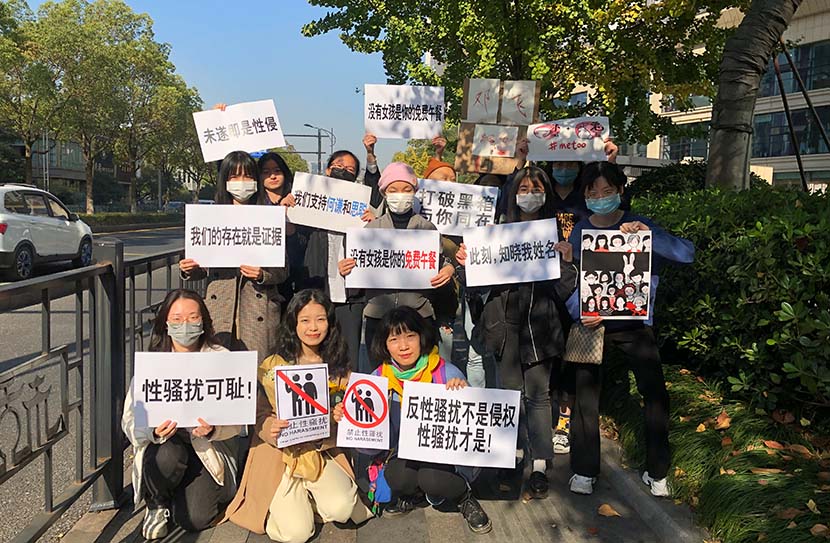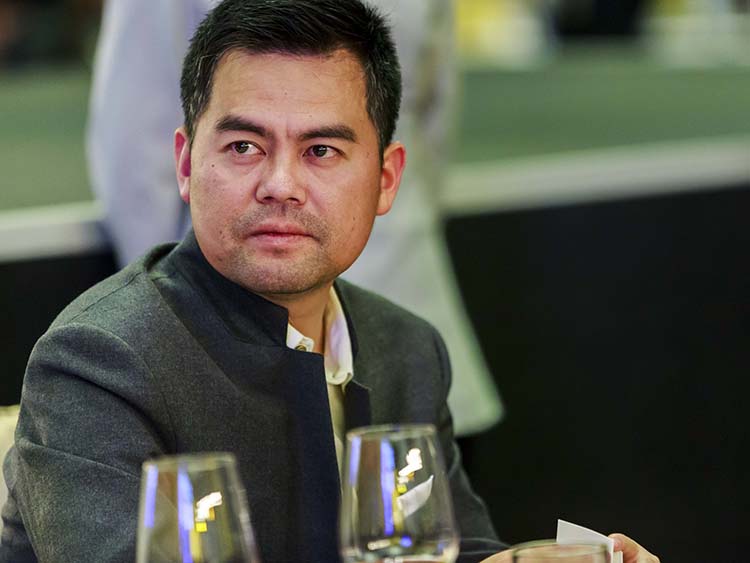THREAD on a recent verdict in a high-profile #MeToo  case turned defamation lawsuit that, while well-covered by a few Western media outlets, is not being reported in China.
case turned defamation lawsuit that, while well-covered by a few Western media outlets, is not being reported in China.
 case turned defamation lawsuit that, while well-covered by a few Western media outlets, is not being reported in China.
case turned defamation lawsuit that, while well-covered by a few Western media outlets, is not being reported in China.
Despite witness testimony from other women sharing similar stories about #DengFei, a well-known child welfare advocate and former journalist, a court ruled there was insufficient evidence to support a former intern’s claims that he harassed her.
In a verdict received by the plaintiff, #HeQian, on Jan. 6, the Hangzhou Internet Court ruled in favor of Deng, who had sued her for defamation over an online post she had written about an alleged encounter at a hotel. https://mp.weixin.qq.com/s/GGDa6Mb-wRJ8-BcT3uZsnA
He is the latest in a string of women in China to be sued by men they say harassed or assaulted them. You can read about the others here: https://www.nytimes.com/2019/12/26/business/china-sexual-harassment-metoo.html
In her social media post from August 2018, He described how Deng, then a senior correspondent with influential news magazine Phoenix Weekly, had allegedly harassed her after inviting her to his hotel room when she was an intern.
The post was published on a WeChat public account run by He’s friend, Zou Sicong, and soon accumulated over 100,000 views — the maximum number WeChat displays.
Here’s a link to the post, titled “Deng Fei: Women Are Not Your Free Lunch”: https://mp.weixin.qq.com/s?__biz=MzAxMDEwODA5MA==&mid=2649830843&idx=1&sn=f1689d04674aa1ad28e55e1c3cc0ad9f&chksm=8350f86eb42771781a99cee296fb255e159d5c5eb59c1d098b5c045959c15fd98747ccb015ff&mpshare=1&scene=1&srcid=0801IFKbCDEyi3CK4m06xIcs&pass_ticket=1894HuVlzzF5h1hrEPIseMIWT6Bb8IbvnbYEPCBGHaymypGO%2BTlHfi1XX1Eac1G2
Here’s a link to the post, titled “Deng Fei: Women Are Not Your Free Lunch”: https://mp.weixin.qq.com/s?__biz=MzAxMDEwODA5MA==&mid=2649830843&idx=1&sn=f1689d04674aa1ad28e55e1c3cc0ad9f&chksm=8350f86eb42771781a99cee296fb255e159d5c5eb59c1d098b5c045959c15fd98747ccb015ff&mpshare=1&scene=1&srcid=0801IFKbCDEyi3CK4m06xIcs&pass_ticket=1894HuVlzzF5h1hrEPIseMIWT6Bb8IbvnbYEPCBGHaymypGO%2BTlHfi1XX1Eac1G2
Deng filed the defamation suit against He and Zou three months later, in late 2018. By July the next year, a trial date had still not been set: https://www.sixthtone.com/news/1004314/hangzhou-sexual-harassment-defamation-case-still-awaiting-trial
In its ruling, Hangzhou Internet Court — one of a few relatively progressive new courts in China specializing in online disputes — said there wasn’t enough evidence “to be sure without a doubt that the situation described happened.”
More on the court: https://www.sixthtone.com/news/1000408/china-launches-court-for-internet-cases-in-hangzhou
More on the court: https://www.sixthtone.com/news/1000408/china-launches-court-for-internet-cases-in-hangzhou
The court also ordered He and Zou to delete their post, apologize to Deng, and pay him 11,712 yuan ($1,800) in compensation for court fees and psychological distress.
For He, this verdict was a devastating blow.
“I’m deeply disappointed,” she told Sixth Tone’s reporter @WanqingZhang65. “Before, I had faith in the legal system. Now I think it’s broken.”
“I’m deeply disappointed,” she told Sixth Tone’s reporter @WanqingZhang65. “Before, I had faith in the legal system. Now I think it’s broken.”
Even after seeing other women sued by those they had accused of harassment, He said she had still felt a glimmer of hope going into the trial:
“I couldn’t help thinking, if my case keeps failing, what will it mean for all the victims of sexual harassment in the future?”
“I couldn’t help thinking, if my case keeps failing, what will it mean for all the victims of sexual harassment in the future?”
Ultimately, however, the evidence she provided — testimonies from a therapist she had seen after the encounter, and from others who said they, too, had been sexually harassed by Deng — failed to persuade the three judges, one of whom was a woman.
Now, He and her legal team are preparing an appeal.
“I want to know how far we can go under China’s legal system,” she said. “For those facing sexual harassment, can their experiences be told in public? Can their wounds be seen, and healed?”
“I want to know how far we can go under China’s legal system,” she said. “For those facing sexual harassment, can their experiences be told in public? Can their wounds be seen, and healed?”
Xu Kai, a lawyer for Zou and He, said the ruling shows that China’s judicial system still fails to protect victims of sexual harassment.
The court, Xu said, put the onus of providing evidence squarely on He and Zou, without holding Deng to the same rigorous standards:
Deng had claimed not to know He, yet she presented a notarized document showing they had added each other on messaging app QQ.
Deng had claimed not to know He, yet she presented a notarized document showing they had added each other on messaging app QQ.
“The ruling is equivalent to telling people who have been assaulted, if you don’t have a recording, a video of the scene, keep your mouth shut,” Xu wrote in a post on his personal WeChat account that he authorized @SixthTone to share.
When @WanqingZhang65 reached out to the plaintiff, Deng, he said the trial had been a major disruption for his child welfare organization. For any future rulings in the case, he said he would “trust the courts and the legal system.”
To Zou, a former freelance journalist, the fact that an accused harasser can say they will simply “trust the law” when it already overwhelmingly favors them is galling.
When #ZhuJun, one of China’s most famous TV hosts, made international headlines after a former intern sued him for allegedly harassing her in a dressing room, he made a similar remark about “trusting the law” — and countersued her for defamation. https://www.sixthtone.com/news/1002972/cctv-host-sues-woman-accusing-him-of-sexual-assault
“The current laws aren’t perfect. Whether it’s a law to protect women from sexual harassment and sexual abuse, or to safeguard the right to reputation and free speech, they’re still flawed and still need to be improved,” Zou told @WanqingZhang65.
He added that when Alabama police commissioner L. B. Sullivan sued the @nytimes in 1964 for running a full-page ad by Martin Luther King Jr. supporters criticizing the Montgomery police for mistreating civil rights protesters, the U.S. Supreme Court said in order to prove libel…
…public officials must show that the person or entity speaking against them did so “with knowledge that it was false, or with reckless disregard for the truth” — a legal provision not recognized in China. https://www.uscourts.gov/about-federal-courts/educational-resources/supreme-court-landmarks/new-york-times-v-sullivan-podcast
In China, there were no legal grounds to sue for sexual harassment until 2019. While a law now exists, its wording is vague, and the standard for evidence is high. https://www.thepaper.cn/newsDetail_forward_2767620
In China’s first courtroom #MeToo  victory, the plaintiff only won after providing a chat history that included the defendant’s apology. https://www.sixthtone.com/news/1005895/plaintiff-wins-chinas-first-sexual-harassment-lawsuit
victory, the plaintiff only won after providing a chat history that included the defendant’s apology. https://www.sixthtone.com/news/1005895/plaintiff-wins-chinas-first-sexual-harassment-lawsuit
 victory, the plaintiff only won after providing a chat history that included the defendant’s apology. https://www.sixthtone.com/news/1005895/plaintiff-wins-chinas-first-sexual-harassment-lawsuit
victory, the plaintiff only won after providing a chat history that included the defendant’s apology. https://www.sixthtone.com/news/1005895/plaintiff-wins-chinas-first-sexual-harassment-lawsuit
All of the above reporting, research, and writing by @SixthTone’s de facto gender correspondent @WanqingZhang65, with editing support from me.
Posted as a thread rather than a published article for the usual reasons.
Posted as a thread rather than a published article for the usual reasons.

 Read on Twitter
Read on Twitter



